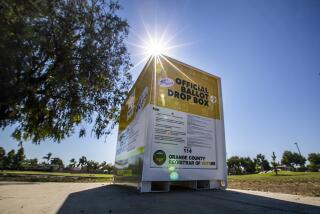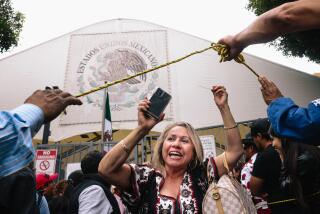Emigres Grapple With Question of Voting in Russian Referendum
From West Hollywoodâs Plummer Park to Brooklynâs Brighton Beach, thousands of Russian emigres are wrestling with a stunning offer from the homeland many of them fled in terror--an invitation to vote Sunday in the make-or-break referendum on Russian President Boris N. Yeltsin.
It is the first time their government has offered expatriates worldwide the opportunity to vote. The sudden turnaround has produced wrenching choices for people once regarded as pariahs for leaving but who still yearn to answer the pleadings of loved ones back home with more than letters.
âI have a lot of friends and relatives in Russia. I send them medications and food and dress and my emotional support,â said Gregory Braverman, 55, a Jewish refugee who plans to vote in West Hollywood, the only designated polling site for Southern California. âIf the people begin to close their eyes and forget about Russia, that would be a big mistake. . . . We have to be strong.â
Russian Embassy officials have hurriedly set up polls in eight other U.S. cities and mounted a get-out-the-vote effort through Russian-language media. Anyone with an unexpired passport from the former Soviet Union--even those from republics outside Russia--will be allowed to mark the four one-question ballots. Results are to be transmitted to Moscow and totaled with votes in Russia.
Preparations are feverish at the tiny Russian Community Center, a city-funded social service agency that will be the host for the voting in West Hollywood, where thousands of Russian Jews have landed in the last decade. Because nothing like this has been tried, no one knows how many eligible voters still carry the crimson Soviet passports.
Center volunteers have spent the week handing out half-page announcements along the east end of town, where Cyrillic signs drape delis brimming with the candies and canned fish favored by the immigrants. The centerâs phones have been ringing continually with calls from emigres who are curious to find out if the rumors are true.
The ironies are as immense as the nation that bred them: voters half a globe away helping decide the fate of a country they never lived in, using the passport of an empire that no longer exists.
âItâs a flaky issue,â said Eugene Levin, a commentator who writes for Panorama, the Russian-language newspaper in Los Angeles. âWhat somebody does in Sherman Oaks could affect what happens to someone in Moscow.â
The news has forced emigres to re-examine their attachment to a homeland most expect never to see again and has ignited a debate: Is the vote a fresh sign of democracy on the march or a cynical gambit to win long-distance votes for Yeltsin?
âPeople are divided,â said Serge Rakhlin, whose Russian-language call-in radio show was bombarded with such arguments Monday. âSome of them have grudges against the motherland. One woman said, âWhy should we vote if they donât pay our pension?â â
Others see the referendum as the best they can do to help loved ones--and a country--they miss dearly. âAll my life is in Russia, in Moscow,â said Anna, a refugee of two years who lives in Hollywood and still fears the authorities in her old country enough to withhold her last name. Sitting outside a classroom where she is learning English, Anna fingered a straw sun hat and fretted. âMy heart is sick while my country goes down.â
Russian officials say the absentee vote reflects a changed stance toward emigres that originated under former Soviet leader Mikhail S. Gorbachev. Those who left the Soviet Union before 1990 lost their citizenship; they gave up their passports and cannot vote Sunday. Most who left since then are theoretically eligible to vote. After the breakup of the Soviet Union, the Russian Federation guaranteed voting rights to all who want to be Russian citizens.
âWe used to think of our emigrants like enemies of the people,â said Rusina Volkova, second secretary of the Russian Embassy in Washington, D.C.. âNow we try to establish new relations and tell them we think about them as part of Russia, but in U.S.A.â
Skeptics see the move as a play for Yeltsin votes among emigres loath to side with the old-style parliamentary Communists who approved the referendum after a critical power struggle with Yeltsin last month.
The referendum will ask whether voters have confidence in Yeltsin; whether they support early elections for the president or for Parliament, and whether they back Yeltsinâs economic reforms. Analysts say the optimum result for Yeltsin would be a personal vote of confidence for him, support for his economic reforms--and a call for early elections for the Parliament but not for the presidency. âIf there is any sizable emigre vote, it would be a Yeltsin vote,â said Vladimir Kozlovsky, who covers politics for the New York-based newspaper Novoye Russkoye Slovo or New Russian Word.
Still, Kozlovsky doubts that many will turn out to vote. Word has been slow getting out, even in tightly knit Russian communities, and many emigres know little about the current issues--or do not care.
âI donât know what is going on there,â said Lyuba Tarnorutskaya, who came to the United States in 1990 and works for a resettlement program in Brooklynâs heavily Russian Brighton Beach section.
Election officials predict that up to 300,000 Russians will vote in the more than 80 foreign countries with Russian missions.
In the United States, voting will take place in New York, Boston, Washington, Philadelphia, Baltimore, Chicago, San Francisco and Seattle, as well as in West Hollywood. But nobody knows how many voters to expect--temporary business travelers and tourists are eligible--because there is no reliable count of Russians with Soviet passports.
Most of those from the former Soviet Union came as refugees. Since 1990, the State Department counts about 180,000 such refugees, along with another 4,000 admitted as permanent residents. Resettlement experts estimate that about 40,000 Soviet Jews live in the Los Angeles area, about 5,000 of whom have come since emigres were allowed to keep their Soviet passports.
Anna no longer carries the passport that she awaited for more than a year, wondering which official to bribe. She will vote in Sundayâs election but thinks her homeland is incurably corrupt.
âI donât believe anybody,â she said through a translator. âNot Yeltsin. Not the Communists.â
Feelings run even stronger among longer-term immigrants whose roots here have taken hold. Some have brusquely refused the election flyers offered by Russian Community Center helpers.
Volunteer Nina Baytalsky understood. âPeople say, âWe donât even want to hear about Yeltsin. Weâre Americans now.â I tell them back, âClinton and Yeltsin are friends now.â â
One woman whose family came as refugees 5 1/2 years ago said: âIâm not worrying about prices in Russia. Iâm worrying about private school tuition for my daughter.â
More to Read
Sign up for Essential California
The most important California stories and recommendations in your inbox every morning.
You may occasionally receive promotional content from the Los Angeles Times.










